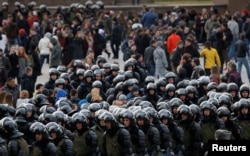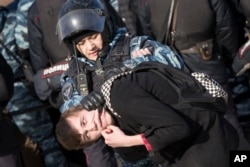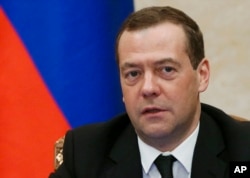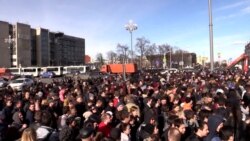A court in Russia sentenced opposition leader and anti-corruption blogger Alexei Navalny on Monday to 15 days in jail for resisting police, and fined him 20,000 roubles, about $350, for organizing what authorities said was an illegal, mass protest in Moscow.
Navalny rejected official claims that the demonstration Sunday afternoon, part of the biggest unsanctioned anti-government protests in years, was illegal.
"In accordance with a decision made by the Russian Constitutional Court, in the event of denial or if no alternative locations were proposed three days prior, we were supposed to go to the initial place. The legal requirements were observed 100 percent," the state news agency TASS quoted Navalny as telling the court.
Kremlin spokesman Dmitry Peskov on Monday said Moscow authorities offered two alternative sites to the organizers, according to the Interfax news agency.
"Those sites were rejected. In actual fact, people were deliberately dragged to unauthorized locations. Of course, one cannot agree with that," Peskov said.
He called the protesters provocateurs looking to incite violence and accused organizers of exploiting children, claiming many were paid to attend but citing no evidence.
Navalny's lawyer said they would appeal the sentence.
Massive protests
Organizers said the demonstrations Sunday against corruption took place in more than 80 cities across Russia.
They were the largest unsanctioned anti-government protests in Russia since 2011-2012 rallies over voter fraud and President Vladimir Putin's return to the presidency.
The demonstrations took place on the 17th anniversary of the first time Putin was elected president.
Hundreds of peaceful protesters were detained in Moscow, some brutally dragged to the ground just for holding signs criticizing authorities and corruption.
Navalny was detained as he arrived at the protest on central Moscow's Tverskaya Street near Pushkin Square. Some observers and journalists were also reportedly detained.
Washington has "strongly condemned" the detention of protesters, including Navalny.
"Detaining peaceful protesters, human rights observers, and journalists is an affront to core democratic values," acting U.S. State Department spokesman Mark Toner said in a statement.
He said the U.S. is "troubled" by the arrest of Navalny, who has announced plans to run for president in the 2018 election.
White House spokesman Sean Spicer said the Russian people deserve a government that supports an "open marketplace of ideas, transparent and accountable governance, equal treatment under the law and the ability to exercise their rights without fear of retribution."
Turning point?
Sunday's event "may be a turning point for Russia's political situation because it shows that the mood in Russian society is changing and people are ready to protest," said Boris Kagarlitsky, director of the Institute for Globalization Studies and Social Movements. "It also shows that a new generation of protesters emerged that did not participate in the protests of 2011-2012 which does not identify itself with any Russia's political or dominant ideologies."
A large number of the protesters were younger Russians of university age.
Some analysts say this could indicate the Kremlin and political elite are losing touch with the younger generation.
"The events will motivate authorities to be more attentive to young people, particularly to teenagers and their communication in the Internet," said Mikhail Chernysh, deputy director of the Institute of Sociology.
"At the same time, I guess that the authorities base their judgment on the fact that young people are not very important for the electoral process because of their sheer number," Chernysh said. "They are much smaller than other age groups. Older people are more numerous and more active as an electoral agent. Unlike young people, they provide for the turnout and thereby make more impact."
The demonstrations were sparked by Navalny's investigation of alleged corruption by Prime Minister Dmitry Medvedev.
Navalny's Fund to Fight Corruption released a YouTube video investigation into property allegedly owned by Medvedev that went viral and has been viewed over 11 million times.
In court Monday, Navalny demanded Medvedev be brought in for questioning. Medvedev has yet to comment on the allegations.
"Another interesting change is that the protests started in provincial cities earlier than the ones in Moscow and the number of people (protesting) in the provincial cities was unprecedented," said Kagarlitsky, of the Institute for Globalization Studies and Social Movements. "These events show that the people are really tired not only of corruption but also of a broader spectrum of economic and social problems."
Navalny defiantly told reporters at the courthouse Monday he would call people to the streets again, saying authorities could detain thousands but not tens of thousands or millions.
WATCH: Russians protest corruption









